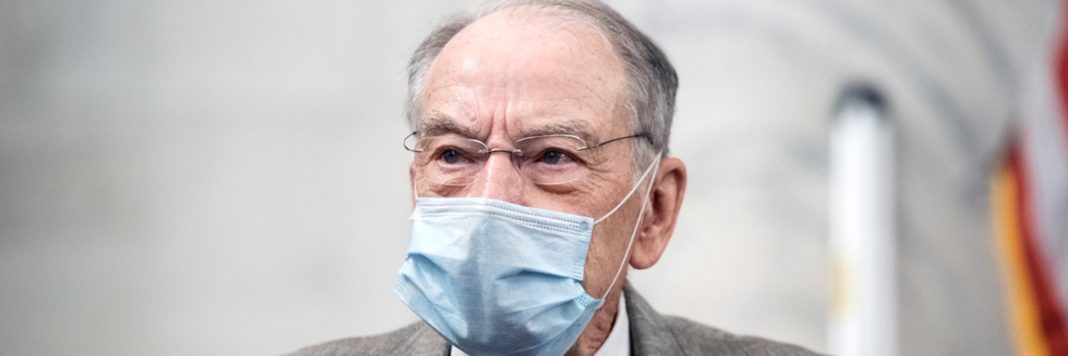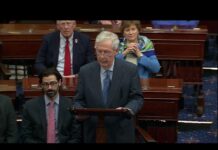United States Sen. Charles Grassley sent the following letter to a constituent who had written to him regarding the 2020 Presidential Election:
Thank you for taking the time to contact me with your concerns regarding the 2020 election. As your senator, it is important to me that I hear from you.
First, I want to be absolutely clear that the violence and disruption we saw on January 6, must not be allowed to disrupt or intimidate us from performing our constitutional duty as lawmakers. I took an oath of office to protect and defend the Constitution, even in the face of threats. I viewed my role in the process of counting the Electoral College votes through this lens.
Throughout the election season and following Election Day on November 3, 2020, I have heard from many thousands of Iowans concerned about the electoral process. I appreciate being made aware of your views as well. My response to you will be the same as the other thousands of Iowans from all political perspectives because there is no possible way to give different responses to each one, and I do not tell different Iowans different things anyway.
The Constitution and our laws give Congress few options and limited authorities when it comes to certifying presidential election results. Congress has no role in conducting elections or adjudicating election disputes, only receiving and formally counting the electoral votes cast in each state. This constitutional process allows the states to determine under their own laws and legal systems how their electoral votes are allocated. And let’s be clear about what the stakes are here. If an objection to a state’s electoral certification is sustained, the state’s electoral votes are thrown out, not reallocated to a different candidate. So anyone voting to object to any state’s certification of electoral votes is voting to disenfranchise an entire state.
The right place to resolve electoral disputes is in the courts. As we saw in Iowa’s Second District House race, there is an established process to review election disputes, and that process should not involve Congress overriding independent judicial decisions. Our independent legal system is tasked with expeditiously evaluating election disputes. To date, 78 lawsuits have been filed by Trump campaign lawyers alleging election irregularities in various states. They have had their day in court but none of them was able to meet the legal standards to prove that there was widespread fraud or irregularities of the magnitude that would affect the election results. In fact, some of the more prominent claims about systematic, widespread fraud have been made primarily in the media, while the actual court filings by the Trump campaign’s lawyers either stipulated that fraud did not occur or such claims were withdrawn.
In December 2020, seventeen states filed suit in the Supreme Court attempting to challenge the election results in four states over claims of fraud and other voting irregularities. Iowa’s Attorney General Tom Miller made the independent decision to not join the Texas lawsuit. Ultimately the Supreme Court dismissed the suit, ordering that “Texas has not demonstrated a judicially cognizable interest in the manner in which another State conducts its elections.”
Politicians in Washington should not second guess the courts once they have ruled, and we cannot and should not consider allegations not formally presented to a court of law. The question before Congress is not whether there are legitimate complaints about how elections were conducted; only whether to accept or reject entirely the electoral votes cast by a state. I could not in good conscience vote to disenfranchise an entire state.
As outlined in the Constitution, the Electoral College met on December 14, 2020, to select the President-Elect and Vice President-Elect of the United States. The results, as certified and transmitted to Congress by the Electoral College meeting in each state, resulted in the election of former Vice President Joe Biden and Senator Kamala Harris.
On Wednesday, January 6, 2021, Congress met to formally count the vote of the Electoral College. This occurred in a joint session of Congress. During this session, a number of representatives and senators raised objections to the certification of the Electoral College result in specific states based on concerns of voting irregularities. This was not unprecedented and occurred three times in the recent past following both the 2000 and 2004 elections of President George W. Bush and the 2016 election of President Trump. The objection in 2005 came in the wake of unsubstantiated conspiracy theories about voting machines changing votes for John Kerry to George W. Bush and was signed by both Representative Tubbs Jones and Senator Boxer. In the ensuing debate in both chambers on whether to reject the electoral vote from Ohio, those members and many prominent members of their party echoed the concerns of many in the grassroots of their party about voting processes in Ohio and elsewhere.
Following the objections raised by members of Congress this time, like in 2005, the House and Senate returned to their respective chambers to debate the matter and vote whether or not to count the votes from the states in question. I opposed rejecting the state-certified vote counts each time it was proposed by the other side and I did again this time. Our Constitution sets up a federal system, of which the Electoral College is a key component, ensuring that states like Iowa have a voice. I swore to uphold the Constitution, therefore I cannot support any effort to undermine the constitutional role of states in elections.
That said, the debate we had was important in airing concerns about election irregularities and restoring faith in our election system. Partisan pundits and politicians who supported such a debate in 2005 are wrong to reject this discussion out of hand. Going forward, it’s important that state legislatures closely scrutinize the events of this election and take necessary steps to promote independence, transparency, and trust in future elections.
As we enter the 117th Congress, I am focused on the pressing issues facing our nation. Although we have made great progress in our battle against COVID-19 and the related economic damage it has caused to our country, there remains much work to be done. Joe Biden and Kamala Harris will be the next President and Vice President of the United States, as President Trump has acknowledged. As your senator, you can rest assured that I will work with them whenever I can find common ground in the best interests of our state and the nation and I will oppose policies that I do not think meet that standard as I have with every other president during my time in Congress.
Again, thank you for taking the time to contact me. Please keep in touch.















